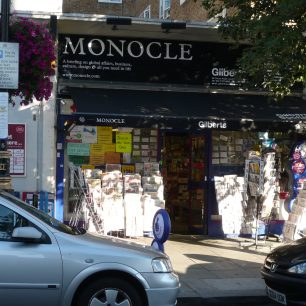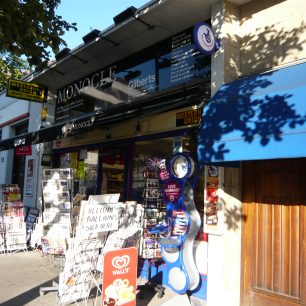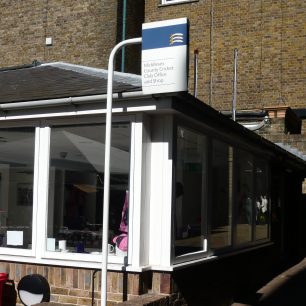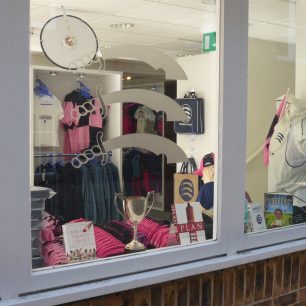Gilberts and Lord's
by Geoffrey Gilbert
Geoffrey Gilbert was born in East Clapton in 1932. His parents were in the East End clothing trade. A period during the War was spent in Bognor, after which the family came back to London where Geoffrey finished his schooling and trained in book-keeping and accountancy. Later, he came to own the shop ‘Gilberts’, in Circus Road.
Lord’s in 1945
“ My first experience of going to St John’s Wood was when I went to Lord’s in 1945 to watch the cricket. They had the Victory Test matches against Australia. The majority had been in the air force. Keith Miller, Carmody, eight slips round the back. It wasn’t very crowded as the War had just ended and cricket hadn’t really started again. The ground was lovely, it was antique. It had the Mound stand which really was a mound. It had old seating like you had in the park, and the whole atmosphere was different to the extent that it was a gentleman’s game and it was played in a gentlemanly manner. And at the same time there were the old Colonel Blimps in the pavilion. Some of them had probably been mummified there since 1938, and it was a ground with character and atmosphere. It is something which doesn’t exist any more because cricket has changed. Cricket that I knew. You knew when to clap, you knew what you were watching. I found it exciting.
I saw the 1953 Test match. I arrived at eight o’clock in the morning on the first day. You paid at the turnstile. I sat on the Grandstand side in the sun. Unfortunately I didn’t have a hat and the following day I had sunstroke. But it was a very interesting game. There was Bedser, Wardle, Evans a wonderful wicket keeper, you remember those things. The first Test match I ever went to was at the Oval in 1939 when the West Indies were playing the Saturday of the game. This was a different time it was a cultured atmosphere with people who understood the game. It was very enjoyable. That has gone because what has taken over now is Money, Money, Money. It is not my cricket any more. Things have changed. It may be evolution but it doesn’t mean that it is good.”
The shop in Circus Road
Geoffrey’s aunt and uncle, Sylvia and Simon, had the shop at 26 Circus Road from 1955. They traded under the name Simon Dove. Geoffrey had a shop in the Holloway Road, number 284. A good friend asked him to go into that business. He put the money in and Geoffrey put the hard work into it. In 1958, that shop was sold and he bought 336 Holloway Road. One shouldn’t look back. There is a beautiful song by a Jewish American woman. “Don’t Look Back, look forward to what may be in the future”. Wonderful words!
In 1965, his uncle and aunt decided to sell, but wouldn’t sell to Geoffrey. They sold to his father who passed it on to Geoffrey. Sylvia is now 100 years old. She hated the world. Geoffrey kept the staff for a time, and one of them told him that his aunt had had arguments with all the shop keepers in the High Street. His father paid £12,500. The properties above were owned by Westminster Council [then Marylebone Council]. They paid rent to the council. Later, they handed the freehold to them in 1970. As well as the ground floor the shop had a basement and a toilet downstairs. The name Gilbert is still above the shop.
His book trade started with Brian Johnston’s autobiography
“In those days you could make a living in St John’s Wood. I used to open on a Sunday and there were very few shops open then. Panzers was there and had a huge following for their smoked salmon and even to this day it is reckoned to be the best in London, but at the same time I had people coming who only used to come at the weekend, especially on a Sunday. I developed the book trade through the late Brian Johnston, a good friend of mine, a charming man, a true English gentleman, it was through him that I established my book business because when he wrote his first autobiography, he came to me and said would you like to put this poster of me in the window, local author. I think it was published by W.H. Allen, and that book came in and flew off the shelves and that helped me really start as a bookseller.”
At the beginning there was the usual stock, cigarettes, tobacco, stationery, confectionery. Gradually, he expanded. His first client at 8.30 am on the first day, was a lady who had been a customer in the Holloway Road. There was such a mix in St John’s Wood then, and lots of families, a large Jewish community. Then he had a list of blue chip people who he held accounts for. Not for everybody. They had a lot of celebrities. Max Jaffa, Frederick Forsyth, Harry H Corbett, the actor from Steptoe and Son. Paul McCartney came in and Geoffrey asked him for a signed photograph for his son and daughter and he brought them each one the following morning. Nice!
Geoffrey lived in Woodside Park N12 when he started the shop. He liked to check and prepare everything. He did not do newspapers. Everything was restricted. Because there was a newsagents at the top of the High Street you couldn’t have a second shop selling newspapers. He was offered them much later but was thinking of selling by then. He thinks that the restrictions were a good thing so that everyone could make a living. He sold some books, especially for children. Reps came round. He sold toys, stationery, confectionery too. He got the toys from a Chalk Farm firm called Patterson and Harris. Also from Mr Gordon, who was a customer too. He had specialist toys, like Mahmood steam engines, and toys from the Continent. Another gentleman sold from his car, selling jokes and tricks. This went down well as they had a lot of young customers. They had young families, they could still afford to live in St John’s Wood. He sold boxes of chocolates, and marron glace, and Godiva chocolates from Belgium came in a big wooden case. The stationery came from John Dickinson from Apsley Mills in Hertfordshire. He went to Drummond Street for other things or to fill in. He stocked Parker pens.
“Now the supermarkets take everything. And there is Amazon, even if you wanted to you couldn’t sell at their price. They probably take 10,000 of something and the publisher will give you a special price for that.”
Toys
“ Off the top end of the shop was the toys, then there was the confectionery and stationery, and then we had the windows. I did the displays, simple displays. Then I began to introduce the toys as no-one round there was doing that. And kids were going to parties all the time. Non-stop! In those days, Thunderbirds was very popular, the James Bond car the DB2, if you could get it. M & B games which were very popular like ‘Operation’, ‘Twister’, and from Waddingtons ‘Cluedo’, ‘Monopoly’, and for the girls there were Barbie dolls, the clothes, other dolls like Kiss Me. We had beautiful dolls which were authentic, and Action Man. And the Sketch, a Graph which was a favourite too. You had a screen and you could draw on it. Very popular.”
“I was a BOOKSELLER”
“In the 1970s, Brian Johnston came in, who was a customer and a friend, we both supported Arsenal. W.H. Allen brought in a big picture of Brian on this cardboard background. He came in and signed books. From that moment I started dealing with W.H. Allen, the first publisher, then I dealt with every publisher in the business, I used to go to book signings. The other sellers in St John’s Wood weren’t book sellers, they were people who sold books, in the same way that you sell a box of matches. I was a Bookseller in capital letters. Most of the books I had read myself so when I was finished at the shop, Yvonne (my wife) was making the meal and while she was doing that I was reading proof copies of the books. I could fit you a book, like if you walked into a shop and were looking for a blouse or a skirt, ‘Yes madam, this is what we have here. Is this what you want?’ I would say ‘what do you like to read’, and so on, and ‘yes, I have got the ideal book for you’.”
“ I remember I was the first person to promote the American authoress, Judith Kranz who wrote ‘Scruples’. Weidenfeld and Nicholson brought the book over from America and I read it and phoned the rep up, and I said, ‘I’ll have 300 copies’. She said ‘How many?’. ‘Send me 300’, and I sold every copy. Some of the big stores, Selfridges, might take 50.
And so I established Judith Kranz, I can say that without anyone arguing. With Jeffrey Archer’s Cain and Able I went to the prelaunch of that book. The first 80 pages of the book are rubbish and the rest is brilliant. I was invited with other booksellers to his flat overlooking the Houses of Parliament on the South Bank of the Thames. He was the most unbelievable host. I was laughing watching him. He didn’t miss a person, he was like a bouncing ball and he spoke to everyone. We must have sold about 300 of that.
Mike Brearley
“And the other book which I sold was Mike Brearly’s first book “The Art of Captaincy”. When I got hold of that, I phoned him up in the dressing room, and asked if I could bring some books up for him to sign and he was very nice and said I could. I told him what I had ordered, he said ‘That’s a lot!’. I said ‘you’ve got a best seller here, I promise you’. That was another one of the books I really went for.
“ I made a mistake occasionally, but not often. I used to have a wide spectrum of books so if you wanted a book on archaeology I could find it for you. If you wanted a book on art I had plenty of those. Another one was Ted Albury who had been in intelligence, a British agent during the war and after and he wrote some of the best spy books that have ever been written. He was a personal friend of one of my customers. You must remember. St John’s Wood then, (and it isn’t today), was a cultured place in the nicest sense. They read a lot. Everybody read, from the children to the grandparents, so you had that wonderful outlet, and at the same time I gave a personal service.”
Geoffrey had a customer called Louise, and when he couldn’t get through everything, she was good at knowing what books would go down well. Now, when Geoffrey goes into the shop, they don’t know anything about books. They haven’t got the background. They are very nice boys, but what do they know about authors and books?
Changes to the Trade
Geoffrey comes from an immigrant family. They didn’t come for social security, because there were no handouts. They came here because of the pogroms of Eastern Europe. “They still hate Jews there“. St John’s Wood was a different place. Geoffrey was good friends with Mr Carruthers who had been a journalist in Kenya and when Idi Amin was pushing all the Indians out, he knew that there would be a change in the retail business here. He was right. They stimulated the corner shop trade and changed it completely. St John’s Wood was an enclave of British people, born and bred here, and it has now changed. It was ‘carriage trade’. Today, you can’t know the families. Half the people don’t speak English, and they don’t believe in our ways. It was very nice. It was a village and it has gone.
Where Richoux now is, was the Coronet Club, it was the first place where the ‘43 Group’ met which was formed to fight Mosley’s Blackshirts. It started in the Maccabi Club in Compayne Gardens in West Hampstead. Their meetings were held there in Circus Road. Next door was Salomone, Italians, greengrocers, whose family first came into St John’s Wood when their parents came in 1910. Then there was Boltons, the cleaners. The late husband of Jackie Collins owned Tramps [the night club], and they opened a burger bar called WC Fields. It could have been about 1970. American style. It was very popular.
Geoffrey would go down to Gower Street to Hamish Hamilton Publishers, and other imprints, in his car. The traffic was easy. You could park outside his shop too. His opening hours were 8.30am till 6pm. His late mother used to help him and he had about six staff, part time, and most were local. Weekends were busy. Westminster Council refused to enforce the covenants which they had given to the shopkeepers. Panzers were not supposed to sell chocolates or confectionery. Geoffrey couldn’t do anything about it, as the council would not enforce this.
Personal Service
It was a personal business and people liked you to be there. Mrs Gilbert (same name, no relation) lived locally and would phone and say “please bring me my cigarettes”. She liked Passing Cloud, a special cigarette I got for her. “No problem!”. Another example was a woman who would phone to ask Geoffrey to choose a present for her boy to take to a party, wrap it up quickly and she would come in and pay. He would do it. It was always at quarter to one on a Sunday. That is the sort of thing you had happen. Now, the High Street has no character. There are no individual shops, it is all restaurants and coffee bars, and estate agents which are the death of the High Street. They don’t bring business. Westminster couldn’t care less. Marylebone High Street is good. They want it to be lively, and it is. St John’s Wood has gone. You had the bespoke baker, a proper baker who baked on the premises. There was the Jewish butcher, Harris butcher. Kent has been there for years. There was a large Jewish population who ate kosher which has now gone.
In the 80s, Geoffrey wanted to get out. In retail if someone wants to steal they do it, and he was having problems with staff. He sold the shop in 1983 to an Indian guy called Michael Patel. He took in newspapers because you could do it then. The advantage was that they only employed their own. They had to look after the shop. It was an advantage. Their children now don’t want to know, they will be going into professions, so they will be facing the same problem in 20 years.
Establishing the shop for Middlesex at Lord’s
“I came to work at Lord’s [Cricket Club] because there was a vacancy in the Middlesex [Cricket Club] (MCC) office at Lord’s and Geoff Norris, the [Barclays] bank manager suggested my name, and I got the job. I did administration, running the shop, and on match days I had to fill the drinks cabinet in the Committee Room and after that you went to the umpires room and made sure they had the cricket balls for the match, a couple of boxes. I went in July 1983 to Middlesex. They didn’t have a proper shop. I was the person who established a proper shop when the new building for the Middlesex offices and shop came into being, in 1984. Len Wynne was the Assistant Secretary. I found a firm which did bomber jackets and other things which were needed. The chairman of Middlesex at that time said,”you are the first person we’ve had who has worked in the outside world, and knows what goes on”.
Tim Lamb was the Secretary at the time. Geoffrey established a very good shop. He had his own staff. He was able to watch cricket occasionally. In 1985 a very young Mark Ramprakash was batting and Geoffrey was called out to see him. He was brilliant. A wasted talent was Shah. He didn’t make use of his talent. MCC used to run Lord’s, whereas now the English Cricket Board run things.
Inside stories
“In the dressing room they had a wonderful attendant. When they had visiting teams people would send up bats to be signed. He knew every cricketer’s signature and he would sign people’s bats . There are people going around and they have bats signed by visiting teams, maybe they couldn’t be bothered to sign them, he used to do it. I’m not going to tell you who it was! You may think it is authentic, but it is not.
“I was one of the only people who was allowed into the Middlesex dressing room, but, before I went in, I followed the protocol. I would bang on the door quite loudly and say to whoever was there, “permission to enter?” and they would say “ yes, Geoff, come in”. I never took advantage of it. It was an honour given to me. The boys were talking, and they knew they could trust me. And I was the only person who was allowed into the pavilion in a bomber jacket. Because I was going on official business. The guys knew me, and never stopped me.
“On one occasion, I was coming down from the dressing room and John Thicknesse, who was the Evening Standard’s cricket reporter, button-holed me on the stairs, and tried to get information from me about something that had happened to Middlesex. I said, “I’m sorry, I don’t know what you are talking about. Goodbye!”.”
For benefits at Middlesex it was always the same people that gave. For Wayne Daniel, Geoffrey went to a benefactor who gave him £2,500 in 1985, and he said that he wouldn’t always give but that Wayne had done a lot for Middlesex. One man he went to said he wouldn’t give to blacks. The only pub which did nothing for Wayne was in Kilburn.
Cricketers Fund Benefits Club
Geoffrey was at Lord’s from 1983-88. Tim Lamb was very nice. One great character, charming man, was Lieutenant Colonel Stephenson, MCC Secretary. One of the nicest. Geoffrey ran the Cricketers Fund Benefits Club, formerly the Cricketers Fund Friendly Society, the first society set up for cricketers. It was formed in 1900. Now the membership has died off. Geoffrey has the original book from the 20s, 30s and 40s. They no longer take any new members because it has been superseded by the Professional Cricketers Association. Cricketers were treated like serfs. The first person to change this, was Fender who would walk over and come out from the dressing room with the professionals. It didn’t necessarily go down well with the members. Between the wars, Harry Sharpe and F.H. Brown, when the young men came down from the university, they were dropped from the first team. It was seen to be a game for gentlemen. The players were not treated wonderfully. One of the nicest characters was Jack Robertson, and whenever Geoffrey sent him his monthly cheque, he would send a nice letter back, and they had a good correspondence. At the end of the season, Phil Edmonds brought down a bottle of wine and a letter of thanks to every member of the office to thank them for what they had done for him during the season. He was the only one who said thank you, and it was greatly appreciated.
“I enjoyed my time in cricket. I made a mistake, I jumped the gun leaving Middlesex when I did, and I should have gone home to my wife and she would have said don’t do anything in a hurry, sit still. Instead I said sod you, I can get a job anywhere, which I did”.








No Comments
Add a comment about this page